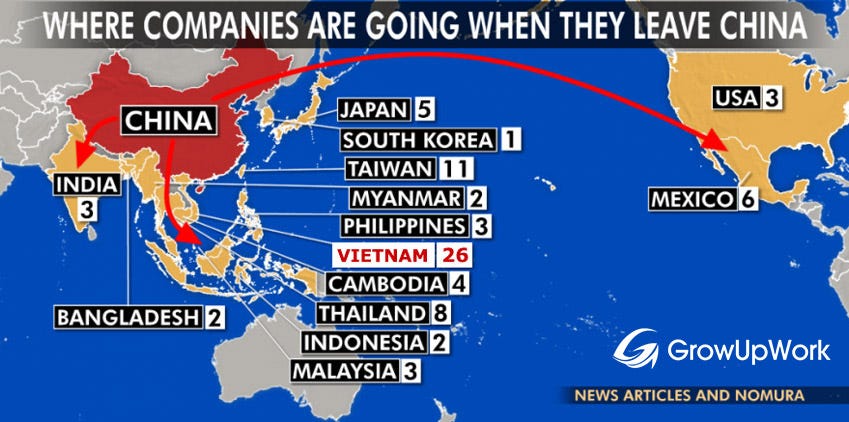Taiwan firms’ ‘crisis of confidence’ in China’s business environment started before Pelosi
- Most
Taiwanese companies doing business in mainland China have moved or
planned to move some manufacturing or sourcing elsewhere, according to a
US think tank poll
- Survey
reflects Taiwanese business executives’ views on mainland China, and
‘military conflict’ was a leading concern even before military drills

More than a quarter of Taiwanese companies with business in mainland China have already relocated some of their production or sourcing elsewhere, and a further third were considering doing so, according to findings by a US-based think tank amid growing tensions across the strait.
Only 31.1 per cent of Taiwanese companies said they had no plans to move any manufacturing or sourcing away from the mainland, in a survey conducted by the Centre for Strategic and International Studies (CSIS) during the week leading up to US House Speak Nancy Pelosi’s visit to the self-ruled island.
The just-released results indicated that Southeast Asia was the most preferred destination among Taiwanese firms that have moved or plan to do so, with 63.1 per cent favouring the region.
A total of 51.3 per cent of respondents preferred moving some of their business back to Taiwan, while 19.5 per cent pointed to northeast Asia, and 10.3 per cent selected South or Central Asia, or about the same percentage as those favouring North America.
Taiwanese companies are highly concerned about their potential over-dependence on the Chinese economy, and the possibility of a military conflict
He added that the results reflect “a crisis of confidence” in China’s business environment among Taiwanese and multinational businesses alike.
“The economies on the two sides of the Taiwan Strait are highly interdependent and are likely to remain so. And companies that reported moving were only saying they were moving a portion of their production and sourcing, not all of it,” Kennedy said.
“Taiwanese companies are highly concerned about their potential over-dependence on the Chinese economy, and the possibility of a military conflict.”
A total of 525 companies took part in the survey from July 25 to August 1, wrapping up a day before Pelosi arrived, and prior to the subsequent military drills conducted around Taiwan by the mainland, which heightened tensions dramatically.
Beijing sees the island as part of China and has never ruled out the use of force to take control. Most countries, including the US, do not recognise Taiwan as an independent state. Washington, however, opposes any attempt to take the island by force.
The survey also showed that Taiwanese companies were moving business operations away from Taiwan, but in smaller numbers. A total of 53.1 per cent of survey respondents were in the services sector, 43.2 per cent were from industrial firms, and the rest were in agriculture.
A total of 13 per cent of respondents said they had already moved some operations out of Taiwan, and a further 20.8 per cent were considering doing the same.
Of those who have already moved, 67.8 per cent went to Southeast Asia, 29.4 per cent moved to Japan and South Korea, and 14.1 per cent moved to South and Central Asia.
However, 20.9 per cent of Taiwanese firms that have moved or were considering moving some operations out of Taiwan said they were heading to mainland China.
“This reverse movement does not come close to fully replacing those moving from [mainland] China, but it reinforces the conclusion that Taiwan is not decoupling from China’s economy,” the CSIS said when releasing its findings.
Instead, CSIS pointed to a combination of two factors – the diversification of global supply chains away from China in certain sectors, and the fact that more mainland demand is being met from within its borders.
While mainland China’s strict zero-Covid policy is a factor in driving away businesses, Taiwanese firms’ decisions appear to be affected by their perspectives on Taiwan’s economy, the island’s economic linkages, cross-strait politics and security concerns – particularly the prospects of a US-China military confrontation, CSIS said.
Nearly a quarter of the surveyed firms said they were in favour of Taiwan’s independence from mainland China, while 69.1 per cent said they preferred the status quo, and 6.1 per cent said they supported unification with mainland China.
What’s more, 38.7 per cent of respondents either “strongly agreed” or “somewhat agreed” with the statement: “There will be some sort of military conflict in US-China relations in the next five years.”
More than half of surveyed companies believed that Taiwan’s semiconductor industry makes an attack by Beijing less likely, and 54.8 per cent agreed that the “US and others will send troops to defend Taiwan in the case of a war with mainland China, because of Taiwan’s leading strengths in semiconductor manufacturing”.
Although the mainland is Taiwan’s largest trading partner and the greatest recipient of Taiwan’s cumulative investment over the past three decades, the mainland was deemed a less important “economic partner” than countries such as the US and Japan.
On a scale of 1 to 5, with 1 being irrelevant and 5 being extremely important, the Chinese market ranked last among the five choices: the US (4.00), Japan (3.87), Europe (3.61), Asean (3.60), and mainland China (3.50).
“The survey’s results are not proof that Taiwan wants to fully decouple from China or be part of a project to heavily isolate China from the global economy,” the CSIS said.
And based on the findings, the US should consider utilising the anxieties of Taiwanese and other multinational companies to press Beijing to improve its policies and behaviour in the areas where companies raise concerns.
“At the same time, the United States should take note that Taiwanese firms have expressed a strong interest in joining multiple regional arrangements, including the Comprehensive and Progressive Agreement for Trans-Pacific Partnership (CPTPP) and Regional Comprehensive Economic Partnership (RCEP).”








No comments:
Post a Comment
Note: Only a member of this blog may post a comment.